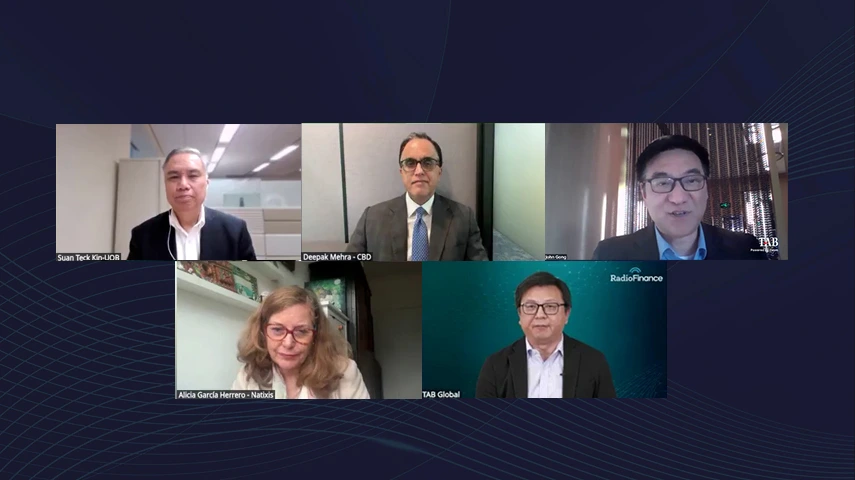
Interviewed By Foo Boon Ping
As the global financial landscape continues to evolve, digital advancements are playing an important role in reshaping transaction finance, according to a panel at a recent Heads of Transaction Finance Roundtable. The meeting was held in conjunction with The Asian Banker Summit 2024 on 23 May at the Conrad in Hong Kong.
Industry leaders from top financial institutions across Asia Pacific met to discuss the transformative impact of digital innovations and core technology modernisation on payment and cash management.
The panel included senior practitioners and leaders from ANZ, Bank BTPN, BNY Mellon, China CITIC Bank International, Fubon Bank (Hong Kong), Hang Seng Bank, Hatton National Bank, JP Morgan, Mizuho Bank, Seylan Bank, Shwe Bank, Standard Chartered, The Bank of East Asia, and Oracle.
One of the primary topics discussed was the modernisation of payment infrastructure, with a focus on the adoption of new standards like ISO 20022 and the integration of fintech innovations. The introduction of instant payment systems and real-time gross settlement has significantly impacted both domestic and cross-border transactions, offering faster and more efficient processing. However, this shift comes with its own set of challenges.
Participants highlighted the difficulties in integrating new technologies with existing legacy systems. The need for substantial investment in infrastructure and technology was a common thread across institutions; legacy systems often lack the flexibility required to handle the rich data sets and extended character fields provided by ISO 20022, leading to issues in data processing and compliance.
Despite these challenges, the benefits of ISO 20022 were clear. The standard enables enhanced data quality and transparency that are crucial for combating financial crime and improving customer service. By leveraging the rich data sets, banks can offer more tailored and efficient services to their clients, thereby enhancing the overall customer experience.
The roundtable also explored the impact of digital innovations in cash management and the growing use of application programming interfaces (APIs) for real-time liquidity and treasury management. The implementation of virtual accounts has revolutionised liquidity-forecasting and management, allowing banks to provide more accurate and efficient cash flow solutions to their clients.
Participants shared their experiences with integrating APIs into their liquidity and treasury management systems. APIs facilitate seamless connectivity between bank systems and client enterprise resource planning systems, enabling real-time cash flow visibility and automated workflows. This integration is particularly beneficial in a multi-bank environment, where managing working capital and operating balances can be complex.
However, the transition to API-driven systems comes with another set of hurdles. The need for robust cybersecurity measures and compliance with regulatory standards were emphasised as critical considerations. Additionally, the adoption of virtual accounts and API solutions requires significant changes in the internal processes and systems of banks, necessitating a strategic approach to implementation.
The discussion also covered the importance of selecting the right technology architecture to enhance legacy systems. Cloud-enabled APIs and microservices were highlighted as key enablers for developing agile and customised banking solutions. These technologies allow banks to be more responsive to client needs and to offer innovative services that were previously not possible with traditional systems.
Another recurring theme was the need for a balanced approach to technology investment. While the adoption of cutting-edge technologies is essential, banks must also ensure that their core systems are resilient and capable of handling increased transaction volumes. The concept of using virtual ledgers as a buffer to manage transaction loads was discussed as a practical solution to this challenge.
The roundtable concluded with an optimistic outlook on the future of transaction finance. Despite the challenges associated with digital transformation, the opportunities for innovation and growth are immense. The consensus among the participants was that the next eight years will see even more rapid advancements in the use of emerging technologies such as artificial intelligence, blockchain and the cloud, fundamentally changing the landscape of transaction banking.

As the global banking industry braces for a challenging 2025, it faces economic headwinds, geopolitical tensions, trade realignments, and the push for sustainability and technological innovation

The AWS Financial Services Symposium Singapore 2024 showcased how AI, data, and cloud technologies are revolutionising financial services. Industry leaders from AWS and HSBC shared insights into advancing innovation, regulatory responsibility…

On the eve of the Singapore Fintech Festival 2024, TAB Global and Temenos hosted an exclusive CXO networking reception at Swissotel, The Stamford. The gathering provided a relaxed setting for executives across the industry to connect and…

The Finance Philippines 2024: Leading Practitioner Roundtable on Technology Modernisation for Digital Banking and Lending Innovation explored the critical role of foundational technologies, financial inclusion, identity verification systems,…

On June 21, The Asian Banker held the 2024 Future of Finance China Summit in Beijing, themed "Challenges and Vision". The year 2024 is expected to be a challenging one globally due to intensified geopolitical tensions and increased trade…

By continuing to browse this website, you agree to our privacy policy.